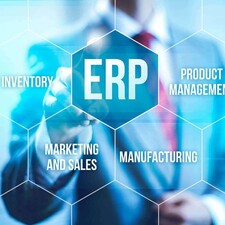Blog
To Make the Right ERP System Investment, Focus on Value Creation, Not Cost - Part 1

Summary
What’s the number one thing we get asked on Live Chat on our website? “How much does your software cost?” While we understand how easy it is to focus on cost numbers, what often gets lost is this: centering your ERP system selection decision on ERP costs, rather than the benefits or value various systems will bring to your business, is short sighted and limiting.
In this post, Alan Salton, President of abas USA, will walk us through some of the most important things to look at when considering value creation from ERP. “Selecting the right ERP system is critical in creating value from your available resources – people, materials, capacity, technology and knowledge,” said Salton.

1. Informational value
No two businesses use data the same way, but they have all most definitely learned, perhaps the hard way, that data utilization without a strategy is not utilization at all.
CRM allows users to understand and act on information no matter where it's generated.
ERP gives structure to gathered data and conditions it for use, providing users with fertile ground for actionable intelligence.
Customer Relationship Management in abas ERP is a good example of this, said Salton.
“CRM is a fully integrated sales tool that centralizes information about existing customers and prospects onto one workbench. It allows users to understand and act on information no matter where it's generated.”
With ERP-powered CRM, businesses treat existing customers like family, drive interactions, nurture prospects and develop smarter messaging, all valuable for sustainable success.

2. Transformational value
Technology has prompted major changes to enterprise processes and business models, which themselves require a shift in how we understand the role of a product or service provider in relation to its market.
Subscription models, for example, have inverted the traditional emphasis on customer acquisition over retention.
As industries evolve in rapid lockstep, the ability to keep pace with that evolution grows more valuable.
“With subscription pricing, obtaining new customers is second to retaining the ones you already have,” says Salton. “Strengthen retention, and you strengthen predictability in your revenue stream and in your supply chain.”
This point is equally important for businesses operating in, or entering into, highly concentrated markets. As industries evolve in rapid lockstep, the ability to keep pace with that evolution grows more valuable.
Whether companies seek to reinvent their established commercial legacies to suit a new era or make names for themselves as they break ground, a flexible ERP system enables them to ride the tides of change without being swept away by the undertow. As products advance, supplies diversify and services snowball with complexity, an ERP system acts as an endlessly configurable network of digital pipelines that support uninterrupted operational excellence in the face of disruption.

3. Organizational value
When leaders reimagine their business to compete in 21st-century markets, they will always find the need to reorganize their operations and resources.
Again, let's use the subscription model as an example.
“Demand forecasts are absolutely necessary under many traditional supply-and-demand models and require precise tracking,” said Salton. “Without them, companies risk missing or overshooting their demand targets.”
But under the subscription model, demand is far easier to track and does not require nearly as much guessing.
However, organizing after a transformation like that is equal parts cutting out and replacing. Transitioning businesses must still build subscription workflows - direct-to-consumer logistics channels, etc. - that traditional models never needed before they can reap the benefits of their innovative model.
Businesses may reorganize to increase efficiency, tear down departmental silos or open up operational bottlenecks
This represents one of many potential changes and one of many potential processes affected by that change. Businesses may also further reorganize to increase efficiency, tear down departmental silos or open up operational bottlenecks.
All these value-add opportunities require ERP systems with Business Process Management functionality that allow users to perform the following:
- Drill down into the discrete tasks that comprise an isolated workflow.
- Evaluate steps in sequential order.
- Rearrange, add or delete parts accordingly.
- Create automated employee notifications or process triggers.
- Uphold standardization with team-accessible workflow mapping.
- Visualize operations for real-time intelligence.
Stay tuned for Part 2 of our exploration of value added through ERP, where we'll look at how ERP systems create value through human capital, advanced technology and future-proofing.
Visit the abas blog for more tips on ERP selection and implementation. Or email us to schedule a demo.

Alan Salton is the President and Founder of abas USA, Inc. and serves on the abas global Board of Directors as the Chief Innovation Officer. He holds a Masters in Technology Management and a Certificante in Business Process Management. With nearly three decades of experience helping businesses of all types and sizes successfully select and implement ERP systems, Salton is an established leader in the ERP industry.
Read the second part of our two-part series on creating value through ERP.


